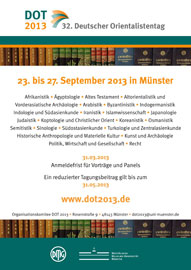“Eco Islam is in Fashion”
Islamic studies scholar: Muslims in the West increasingly advocate protecting the environment

Monika Zbidi
According to academic findings Muslims in Western countries are increasingly committed to protecting the environment. “The movement of eco-Islam is spreading most notably in Europe, the USA and Canada,” says Islamic studies scholar Monika Zbidi who will present her research findings at the 32nd German Oriental Studies Conference (Deutscher Orientalistentag, DOT) in Münster in September. More than 1,000 researchers from all over the world are expected to attend the conference. “The eco-activists engage in protecting animals and plants, warn against the careless use of resources such as soil and water and advocate frugality and abstinence for religious reasons. They base their conviction particularly on passages from the Koran and the Sunnah, on the statements and deeds of the prophet Muhammad.” Currently it may only be called a niche movement, but the Islamic environmental movement is gaining momentum through websites, blogs and social networks.
According to Zbidi, the minds behind the “Islamic Environmentalism” which started in the 1960s are the Iranian philosopher Seyyed Hossein Nasr and Fazlun Khalid, an eco-activist living in Great Britain. Currently the movement is largely restricted to Western countries. “However, this does not mean that there is no ecological awareness in Arab or African countries. For example in Tunisia a number of environmental organisations have been founded since the revolution in 2011, though less for religious reasons.” To what extent this eco Islam will find supporters in Arab countries is not yet foreseeable. For her dissertation project Zbidi analyses relevant websites, weblogs and activities in social networks, and evaluates texts by Muslim researchers and scholars on environmental ethics and the role of the environment in the Koran.
Less meat consumption taking Muhammad as a model
“Islamic conservationists are mainly young Western graduates who grew up with debates on the destruction of the environment and climate change and who want to commit themselves as Muslims,” says Zbidi who is doing a doctorate on Islam and ecology at the University of Erlangen-Nuremberg. “In Facebook groups and blogs, such as for instance ‘The Eco Muslim’ or ‘khaleafa.com’, people call attention to the fact that the respect for creation is deeply anchored in Islam and they campaign for an ecological lifestyle among Muslims. For example during Ramadan the blogs advise against wasting food.” On these platforms people also discuss “whether intensive animal farming violates the principles of Islam and whether believers should eat less meat taking Muhammad as a model.”
An increasing number of Islamic organisations and initiatives also show an ecological awareness as the researcher shows. For example, Muslim communities in the British town of Huddersfield are engaged in constructing their new mosque in a sustainable way. Similar projects are planned in Cambridge and Norderstedt near Hamburg. “Especially today, with Islam having a poor image, many Muslims are proud that their religion calls for and supports an environmentally friendly behaviour.”

Poster of the 32nd German Oriental Studies Conference
Brochures and projects advertise practical environmental protection as well – be it in daily life or on a pilgrimage. The “Muslim Green Guide to Reducing Climate Change” from 2008, for instance, offers instructions on how to recycle, save electricity and use public transport. “The individual chapters begin with quotations from the Koran. They are meant to clarify to the reader that environmental protection is part of their faith.” Among the editors is the “Islamic Foundation for Ecology and Environmental Science” (IFEES), founded by Fazlun Khalid as early as 1980 and headquartered in Birmingham, which is said to have significantly promoted Islamic environmental protection in the early stages. Another brochure, the “Green Guide to Hajj”, published by the British non-government organisation “Alliance of Religions and Conservation” (ARC), addresses pilgrims in particular. They are encouraged to use only environmentally friendly products on the pilgrimage, reduce waste and continue to live sustainably after they return.
Eco Islam is based on Islamic ecological ethics that interprets the sayings of the Koran and the Hadith in an ecological way, the Islamic studies scholar explains. “According to this interpretation the entire world consists of signs of God and therefore deserves protection. God has given man as governor the responsibility for creation. It is thus his task to restore the equilibrium on earth that was disturbed by the climate change.” According to the scholar, the protection of animals can also be proved with the Koran: using quotations by the prophet Muhammad according to which he takes good care of animals and punishes cruelty to animals. For many Muslim eco-activists the Islamic faith is the most important motive for their commitment as Zbidi’s research shows. “Their dedication to the environment is of special significance owing to the religious foundation. The activists consider it their duty and believe that they will be rewarded for their commitment to creation in the afterlife.” The feeling of togetherness in projects as well as campaigns is also of great importance for the motivation.
According to Zbidi, the Islamic ecological activism started in the 1960s, amongst other things, as a reaction to the controversial theories of the historian Lynn White Junior who believed the monotheistic religions to be the root of the ecological crisis. “Muslim scholars and academics who immigrated to Western countries started to look into ecology, sustainability and a responsible use of nature.”
Monika Zbidi is a PhD scholarship candidate of the Deutsche Bundesstiftung Umwelt (German Environment Foundation, DBU). Until March 2013 she was a research assistant at the Department of Oriental Philology and Islamic Studies of Friedrich-Alexander-University/Erlangen-Nuremberg. Her dissertation project investigates eco Islam as a contemporary Islamic current. She will present first findings at the German Oriental Studies Conference (Deutscher Orientalistentag, DOT) in the section “Islamic Studies”. Overall, scholars will present recent research results about cultures in Asia, Africa and Arab regions in about 900 lectures and 80 panels. (ska/vvm)

